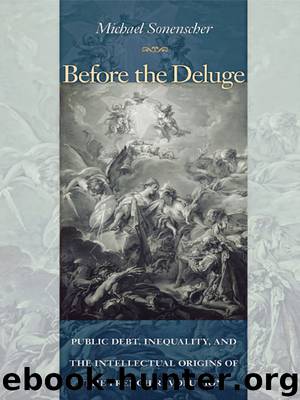Before the Deluge by Sonenscher Michael;

Author:Sonenscher, Michael;
Language: eng
Format: epub
Publisher: Princeton University Press
INDUSTRY AND REPRESENTATIVE GOVERNMENT
AGRICULTURE, INDUSTRY, AND INEQUALITY
IT IS now usual to claim that the French Revolution was a political revolution with social consequences. In the eighteenth century, it was equally usual to expect a social revolution with political consequences. Not every-one was willing to look forward to it as “the moment of the great revolution” with as much anticipation as the marquis de Mirabeau’s protégéAntoine Court de Gebelin appears to have done at the time of the American war, or claim, as he put it, that “the restoration of the grand order was reserved for our century.”1 Even Mirabeau was stunned when another of his protégés, Charles Butré, announced that the order in question would not be based on agriculture. As Mirabeau commented acidly, Butréhad discovered “by chance” that “man was not made to labour” because there was, apparently, “a higher order than the natural order.”2 But however un-usual the prognosis may have been, the broader concern with scaling back the extremes of wealth and poverty and reverting to a more balanced inter-relationship of agriculture, industry, and trade lay at the core of the eighteenth century’s assessments of the nature and future of the modern world. The idea of a structural transformation of the public sphere that has captured so many historical imaginations in more recent times is a modern version of the same idea, echoing the eighteenth century’s concern with rebalancing the relationship among absolute governments, centralised courts, capital cities, and the rest of society so that the human capacity for commerce—in the broad, eighteenth-century sense of the term—could be anchored to a genuinely reciprocal set of social arrangements. In its original version, the idea looked backwards, from the perspective of a world already taken to be too modern. In its modern version, the idea looks for-wards, from the perspective of an old regime already taken to be too back-ward. The perspectives may have changed, but the telos is still the same.
In this respect, Physiocracy was simply a more analytically sophisticated version of the more widely shared view that the modern world’s overcommitment to industry, trade, empire, war, and debt could not last. But a great deal more of what Pierre-Samuel Dupont de Nemours called the new science of political economy was also connected to the same concern. This was one reason why the American Benjamin Vaughan could still, in 1788, associate Fénelon, not Adam Smith, with what he took to be the basic principles of political economy.3 Although it diverged fundamentally from both Rousseau and Physiocracy in this respect, much of the late eighteenth century’s interest in the more positive aspects of public credit was centred upon the problem of finding a way to block the effects of inequality and overcentralised government that Fénelon had identified as the two great threats to modern political societies. Sir James Steuart’s “rhapsody” about the levelling effects of a public debt was, in this sense, very Fénelonian. So, too, was the argument about using public credit to promote social justice by pushing
Download
This site does not store any files on its server. We only index and link to content provided by other sites. Please contact the content providers to delete copyright contents if any and email us, we'll remove relevant links or contents immediately.
International Integration of the Brazilian Economy by Elias C. Grivoyannis(57388)
The Radium Girls by Kate Moore(10915)
Turbulence by E. J. Noyes(7057)
Nudge - Improving Decisions about Health, Wealth, and Happiness by Thaler Sunstein(6642)
The Black Swan by Nassim Nicholas Taleb(6203)
Pioneering Portfolio Management by David F. Swensen(5616)
Rich Dad Poor Dad by Robert T. Kiyosaki(5162)
Zero to One by Peter Thiel(4834)
Man-made Catastrophes and Risk Information Concealment by Dmitry Chernov & Didier Sornette(4748)
Secrecy World by Jake Bernstein(3788)
Millionaire: The Philanderer, Gambler, and Duelist Who Invented Modern Finance by Janet Gleeson(3576)
Skin in the Game by Nassim Nicholas Taleb(3477)
The Age of Surveillance Capitalism by Shoshana Zuboff(3432)
The Money Culture by Michael Lewis(3291)
Skin in the Game: Hidden Asymmetries in Daily Life by Nassim Nicholas Taleb(3272)
Bullshit Jobs by David Graeber(3190)
The Dhandho Investor by Mohnish Pabrai(3176)
The Wisdom of Finance by Mihir Desai(3086)
Blockchain Basics by Daniel Drescher(2896)
